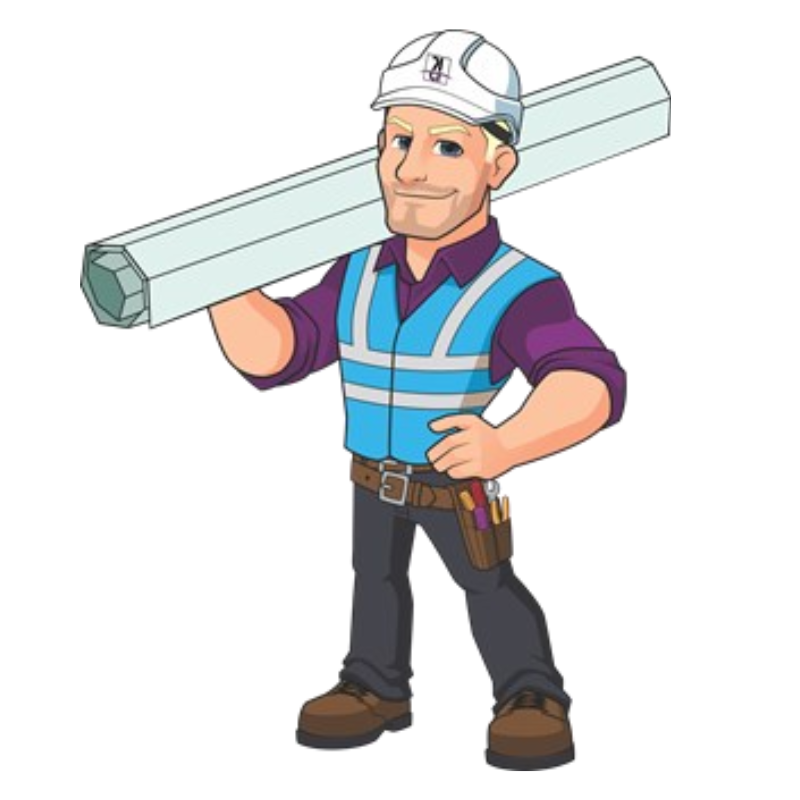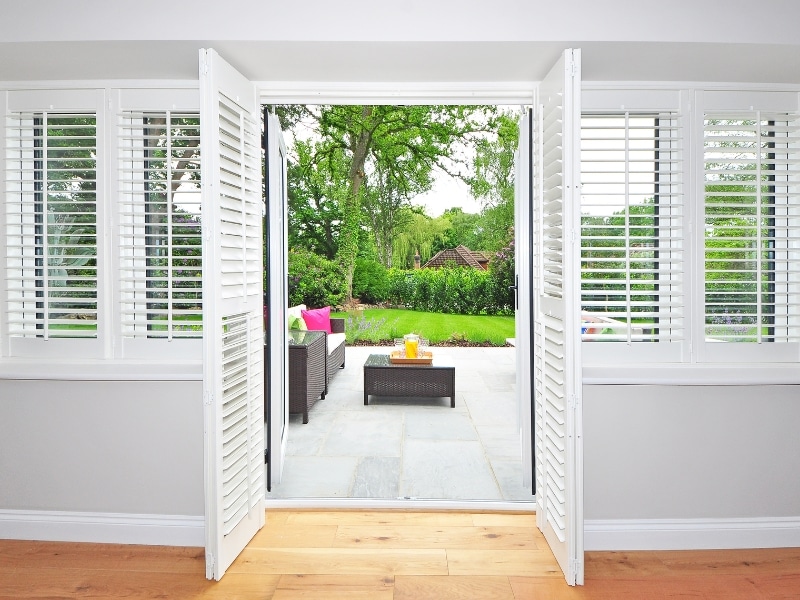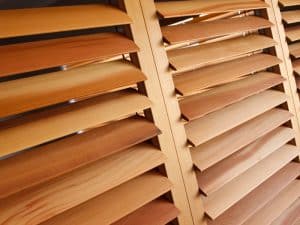Plantation shutters are a popular choice for homeowners looking to enhance the aesthetic appeal and functionality of their windows. With a variety of materials available, choosing the right one can be a bit tricky. This guide will explore the best material used for plantation shutters, their benefits, and how they compare to one another.
What Are the Different Materials Used for Plantation Shutters?
Plantation shutters come in several materials, each offering distinct advantages depending on your needs. Here are the most common types:
- Timber Shutters: Made from natural wood, timber shutters offer a classic and elegant look. They are lightweight and durable and can be customised to fit any window size.
- Polymer Shutters: These shutters are made from a synthetic material that mimics the appearance of wood but is more resistant to moisture. Ideal for bathrooms and kitchens, polymer shutters are easy to maintain.
- Aluminium Shutters: Aluminium shutters are durable and ideal for outdoor areas. They resist the elements, making them perfect for balconies and patios.
- PVC Shutters: PVC shutters are a great alternative to timber, offering durability and resistance to humidity. They are budget-friendly and perfect for high-moisture areas.
- Hybrid Shutters: These combine the best of timber and polymer, offering the warmth of wood with the practicality of synthetic materials.
Each material has unique benefits, so it’s important to understand how they perform in different environments.
Which Material Offers the Best Durability for Plantation Shutters?
Durability is one of the most important factors when selecting plantation shutters. Here’s how the materials stack up in terms of long-term performance:
Material | Durability | Best For | Pros |
Timber | High | Living rooms, bedrooms | Elegant look, customisable |
Polymer | Very High | Bathrooms, kitchens | Moisture-resistant, low-maintenance |
Aluminium | Very High | Outdoors, patios | Weatherproof, strong |
PVC | Moderate to High | Budget-friendly areas | Moisture-resistant, affordable28 |
Hybrid | High | Versatile applications | Combines durability and aesthetic appeal |
How Do Different Materials Affect Insulation and Energy Efficiency?
Plantation shutters do more than add style — they also boost your home’s energy efficiency. To understand their impact, let’s explore how plantation shutters help with insulation and how each material performs:
- As a natural insulator, wood plays a role in maintaining a stable indoor climate, reducing the need for excessive heating in winter and cooling in summer. Timber shutters are a great choice for homes in areas with extreme temperatures.
- Polymer shutters are excellent at insulating, often better than wood due to their density. By providing a barrier to external temperatures, they can help reduce energy bills.
- PVC offers good insulation properties and is ideal for areas where you need to control temperature.
- Hybrid shutters combine the insulating properties of wood with the practicality of polymers, making them a great choice for energy efficiency.
- Aluminium may not offer the same level of insulation as timber or polymer, but it still provides decent energy efficiency when paired with insulating layers. Learn about the resilience of outdoor aluminium plantation shutters in varying conditions, as their durability allows them to withstand harsh weather while still contributing to energy savings.
Best for Insulation: Timber and polymer shutters stand out for their superior insulation and energy efficiency.
Does the Material of Plantation Shutters Impact Their Maintenance Requirements?
Maintenance is key when selecting plantation shutters, and the material you choose can significantly affect the effort involved.
- Timber requires regular maintenance, including re-oiling or varnishing, to prevent the wood from warping or cracking. They are more prone to damage from moisture.
- Polymers are easy to clean with a damp cloth and require minimal maintenance. They don’t warp, crack, or fade easily.
- Aluminium is incredibly low-maintenance. It requires little more than the occasional wipe-down to stay looking fresh.
- PVC shutters are similar to polymer in maintenance needs. They’re easy to clean and resistant to stains.
- Hybrid shutters are relatively low-maintenance, combining the best of wood and synthetic materials.
Best for Low Maintenance: Polymer and aluminium shutters are ideal for those looking for a hassle-free solution.
Are Custom Plantation Shutters Available in All Materials?
Yes, custom plantation shutters are available in all materials. Customisation allows you to select the perfect shutter for your needs, whether you’re after a unique colour, size, or design. Many companies offer tailored plantation shutters to fit your specific style and functional requirements.
Custom Options:
- Timber Shutters: Custom sizes, finishes, and colours are available to suit your home’s decor.
- Polymer Shutters: Custom designs and finishes can also be requested.
- Aluminium Shutters: These can be made to measure and are available in a range of colours.
- PVC Shutters: PVC shutters are available in custom sizes and are affordable for those on a budget.
- Hybrid Shutters: Custom hybrid shutters are designed to fit any window and offer a combination of aesthetics and durability.
Best for Customisation: Timber and hybrid shutters are often chosen for their flexibility in design, but all materials can be customised to suit your space.
Which Material Is Best for Plantation Shutters in Terms of Appearance and Style?
The appearance of your plantation shutters will impact the overall look of your room. Here’s how different materials compare:
- Timeless, natural wood offers a luxurious look that complements traditional and modern spaces alike. Wood’s grain patterns and textures add a rich and warm feel to any room.
- Polymer shutters can be made to mimic the appearance of wood, but at a more affordable price. They have a smooth finish and work well in both contemporary and coastal styles.
- Aluminium shutters offer a sleek, modern aesthetic, making them ideal for industrial or minimalist designs and well-suited for outdoor and high-security applications. Given their durability and stylish design, aluminium is also often preferred in energy-efficient, modern builds, aligning with the passive house standard for Australian homes.
- PVC shutters offer a clean, uniform appearance. While not as stylish as timber, they can work well in more utilitarian spaces such as kitchens and bathrooms.
- Hybrid shutters offer a balance of style and practicality. They can be finished in various colours and are designed to suit both traditional and modern spaces.
Best for Appearance: Among all options, timber shutters stand out as the most elegant and versatile, offering a wide range of aesthetic appeal to suit any interior.
Conclusion: Choose the Right Plantation Shutter for Your Needs
When choosing the perfect plantation shutters to enhance your windows, consider factors like durability, insulation, maintenance, and style. Each material—from timber and polymer to aluminium and hybrid—offers its own strengths depending on where and how it’s used. Whether you prefer the warmth of natural wood or the practicality of moisture-resistant options, there’s a shutter material suited to every space and lifestyle. If you’re unsure which one to choose, you can connect with iStyle Shutters to explore options.



